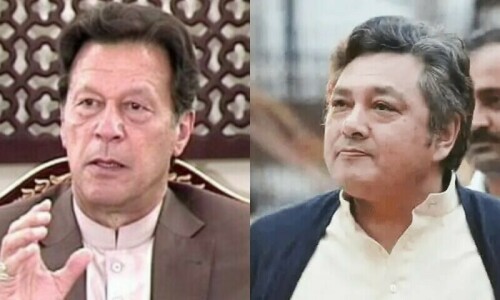ISLAMABAD: The counsel for former prime minister Imran Khan urged the Islamabad High Court (IHC) on Tuesday to discard the testimony of the former principal secretary to PM in the cipher case, since it was ostensibly obtained under dubious circumstances.
Barrister Salman Safdar made this argument before an IHC division bench, comprising Chief Justice Aamer Farooq and Justice Miangul Hassan Aurangzeb, which resumed hearing on appeals filed by Mr Khan and former foreign minister Shah Mehmood Qureshi against their conviction in the cipher case.
The counsel pointed out that Azam Khan, once a close confidant of the former PM and an accused in the case, went missing in June 2023.
Then, instead of recording his confession, he testified against the ex-premier before an investigation officer and magistrate, argued Mr Safdar.
PTI founder appreciates SC suo motu on judges’ letter, says full court hearing ‘would’ve been better’
He said the case’s first information report was registered on Aug 15, 2023, and Mr Khan recorded his statement on the very next day.
The IHC bench perused the record and found that Azam Khan went missing on June 15 and re-emerged on July 20, recording his statement a month later.
Mr Safdar raised doubts about the ex-bureaucrat’s testimony, arguing that it was recorded under dubious circumstances.
Therefore, the court should not give any credence to his testimony, he argued, adding that the magistrate recorded the statement without issuing prior notice to other accused persons.
Later, the court adjourned further hearing till today (Wednesday) when Barrister Safdar would continue his arguments.
During the course of the hearing, the counsel for PTI leaders has repeatedly questioned the conduct of Mr Khan’s former principal secretary in the case.
‘Under-pressure judges’
Speaking to media persons after attending proceedings in the £190 million corruption case, Mr Khan on Tuesday claimed that he was convicted by “under-pressure judges”.
Mr Khan said that accountability judge Mohammad Bashir, who convicted him in the Toshakhana reference, was under pressure and admitted to the jail hospital due to stress.
Likewise, senior civil judge Qudratullah has said that he could not proceed for a Walima ceremony unless the trial in the Iddat case concluded.
He welcomed the Supreme Court suo moto notice on a letter written by six judges of the Islamabad High Court (IHC), who complained about interference of the intelligence agencies in judicial affairs. However, he said it would have been better if a full court heard the matter.
Published in Dawn, April 3rd, 2024














































Dear visitor, the comments section is undergoing an overhaul and will return soon.